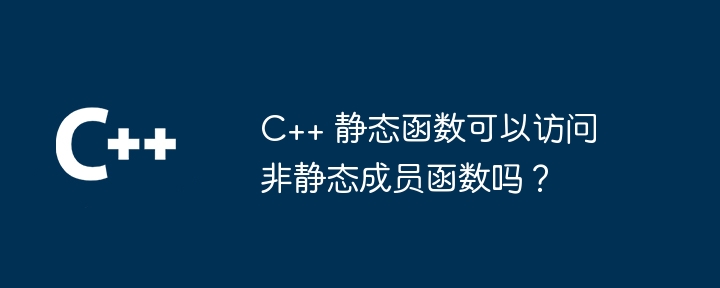
In C, static functions cannot directly access non-static member functions. Solutions include: 1. Access through object pointers; 2. Access through class scope operators.

Static function in C accesses non-static member function
In C, static function is a special member function. It is not associated with any specific object in the class. This means that static functions cannot directly access non-static member functions (i.e. ordinary member functions).
However, this limitation can be solved in the following two ways:
1. Access through object pointer:
Create an object pointing to the current class pointer, and then use the pointer to access the non-static member function. For example:
class MyClass {
public:
static void staticFunction() {
MyClass* obj = new MyClass();
obj->nonStaticFunction();
delete obj;
}
void nonStaticFunction() {
// ...
}
};2. Access through class scope:
If the non-static member function is public, you can access it through class scope operator (::) for access. For example:
class MyClass {
public:
static void staticFunction() {
MyClass::nonStaticFunction();
}
static void nonStaticFunction() {
// ...
}
};Practical case:
Suppose we have a Student class, which contains a member function getGrade() and a static function printGrade(). printGrade() Requires access to getGrade() to print student grades.
class Student {
public:
int grade;
void getGrade() {
// 获取学生的成绩
}
static void printGrade(Student* student) {
student->getGrade();
// 通过对象指针访问非静态成员函数
}
static void printGrade() {
Student student;
student.getGrade();
// 通过类作用域访问非静态成员函数
}
};In this case, printGrade() can be accessed both through the object pointer and getGrade() through the class scope.
The above is the detailed content of Can C++ static functions access non-static member functions?. For more information, please follow other related articles on the PHP Chinese website!
 What are the differences between c++ and c language
What are the differences between c++ and c language
 Recommended learning order for c++ and python
Recommended learning order for c++ and python
 Cost-effectiveness analysis of learning python and c++
Cost-effectiveness analysis of learning python and c++
 Is c language the same as c++?
Is c language the same as c++?
 Which is better to learn first, c language or c++?
Which is better to learn first, c language or c++?
 The difference and connection between c language and c++
The difference and connection between c language and c++
 C++ software Chinese change tutorial
C++ software Chinese change tutorial
 Cost-effectiveness analysis of learning python, java and c++
Cost-effectiveness analysis of learning python, java and c++




